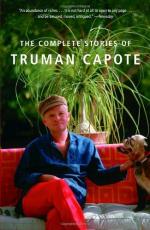|
This section contains 1,141 words (approx. 4 pages at 300 words per page) |

|
SOURCE: “From Gothic to Camp,” in The Critical Response to Truman Capote, edited by Joseph J. Waldmeir and John C. Waldmeir, Greenwood Press, 1999, pp. 95–7.
In the following essay, originally published in 1964, Malin contends that Capote's fiction has descended from Gothic supernaturalism into camp.
Perhaps the best clue to Capote's talent is one line from “Shut a Final Door”: “All our acts are acts of fear.” In such early stories as “A Tree of Night,” “The Headless Hawk,” and “Master Misery,” he presents characters who are afraid to stare at their furious shadows. Why are they afraid? What causes their exaggerated, childish reactions? We don't know. Capote refuses to analyze his characters—it is hard to call them people—he takes their fear as a psychological axiom, not grounding it in classic Freudian theories. In a way this is his most significant insight: he realizes that fear, never completely...
|
This section contains 1,141 words (approx. 4 pages at 300 words per page) |

|


